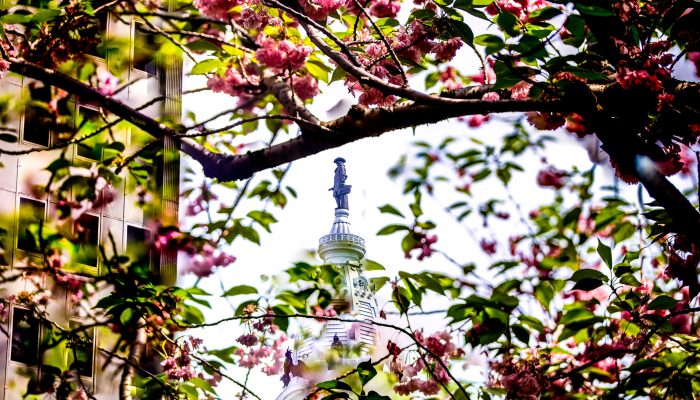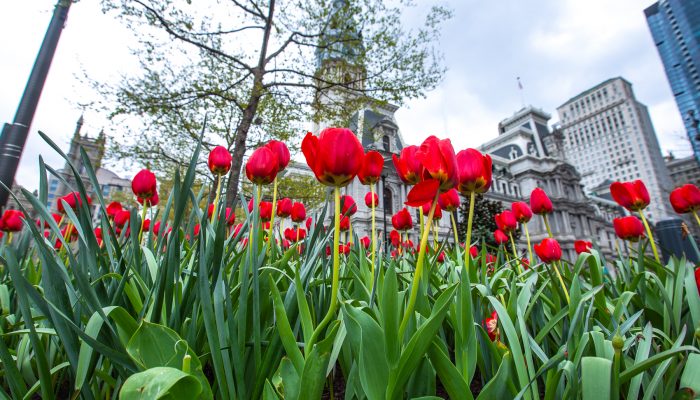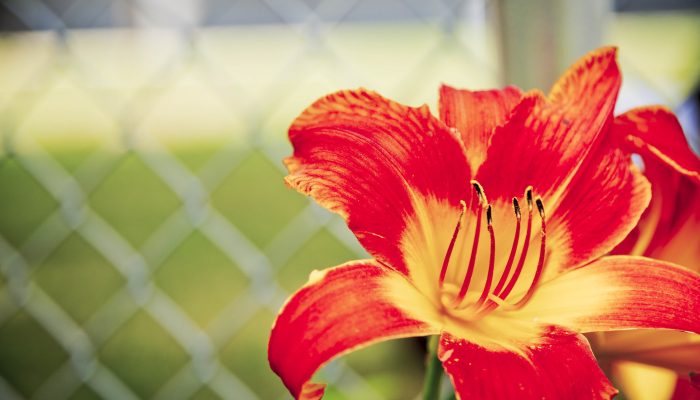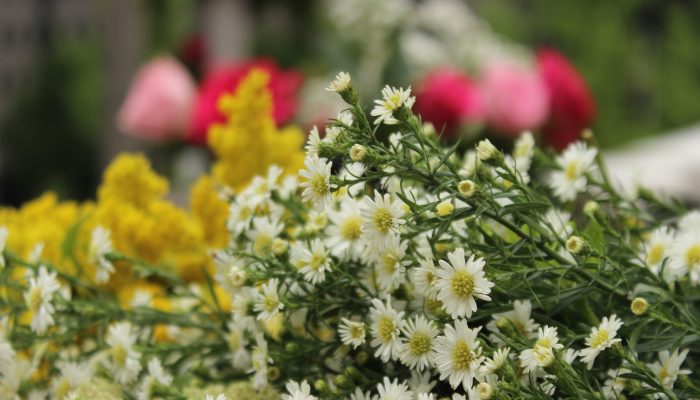Reverend Naomi Washington-Leapheart is an adjunct professor of Theology and Religious Studies at Villanova University. Most recently, she served as the Faith Work Director for the National LGBTQ Task Force, the country’s oldest national LGBTQ justice and equality group. In that role, she coordinated the Task Force’s public faith messaging and advocacy and leadership development work in faith communities. Before joining the Task Force, Rev. Naomi was a faith organizer for POWER, a multi-faith, multi-racial network of congregations in Southeastern and Central Pennsylvania. She also served as Co-Pastor and Minister of Music at Wisdom’s Table at St. Peter’s United Church of Christ. An ordained minister, she earned her Master of Divinity degree from Lancaster Theological Seminary in 2016 and is proudly affiliated with the Fellowship of Affirming Ministries.
Rev. Naomi was also recently named a LGBTQ Faith Leader to Watch in 2019 by the Center for American Progress and as one of The Root 100.
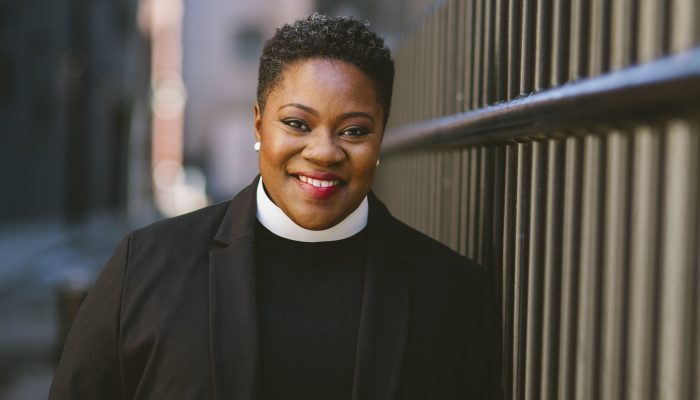 Welcome to the Office of Public Engagement, Rev. Naomi! What brought you to work for the City?
Welcome to the Office of Public Engagement, Rev. Naomi! What brought you to work for the City?
I am so excited to get started! The position I had before was a faith-focused role that was national in its scope. I engaged and organized in communities of faith around the subject of LGBTQ rights and justice, and that took me all over the country—to rural and urban communities, racially homogenous and racially mixed communities, and all kinds of faith traditions. It took me to DC often to advocate in front of Congress and at the Supreme Court, and other spaces of power. I found that work exhilarating, especially over the last three years when we’ve seen attempts to roll back and eliminate rights for LGTBQ people. At the same time, I missed the local community of faith that nourished and raised me.
I’d come to faith work as a church girl who was raised at the ankles of old Black church women who taught me how to speak, how to sing, how to laugh, how to lament, and how to mourn. I found that in talking with and engaging the powers-that-be in these elite spaces, I missed the touch and the feel of local communities. So, this new position presented an opportunity in some ways to be a church girl again and to talk to regular everyday people of faith. It gives me a chance to talk to them about issues related to justice, quality of life, freedom, and fairness. This is really a return for me to the kind of communities that raised me and formed me, so I’m excited about that opportunity.
Congrats on recently being included in The Root 100, an annual list of the most influential African Americans, ages 25 to 45! Tell us more about the work that led to you being recognized among such a venerable list of leaders.
The Root 100 was such a delightful surprise—I didn’t know it was happening. Someone saw the list and then tagged me in it, and that’s how I found out! I think that over the last couple of years the context of our national politics has really afforded visibility towards the work that I was doing. The attempts by the Trump administration to undermine the work that so many people have already done to secure freedom and justice for LGBTQ folks—it’s all just unconscionable to me. This moment presented the platform to speak not only to the halls of government, but also to faith communities who were sanctioning discrimination and exclusion.
The acknowledgement from The Root is an affirmation of that work. I’ve visited congregations offering sermons and words of reflection not only to push and to challenge, but also to affirm and uplift LGBTQ folks in those spaces. We brought sacred rituals to political spaces. We organized vigils on the steps of the Supreme Court, within the halls of Congress, and at the Pulse nightclub massacre site, to bring the sacred rites of mourning, protest and prayer to those political and public places.
One other thing I did in my former role was train people of faith and organizers about how to discuss LGBTQ rights and advocate to their legislators about making just policies for LGBTQ folks. We developed their leadership capacity and political literacy so that people could do this work themselves in their own communities.
We also tried to shift the narrative around movement leadership. The LGBTQ rights movement has struggled to prioritize the lived experiences and expertise of those who are most vulnerable and most impacted by anti-LBGTQ sentiment. As a Black, queer woman, I am standing on the shoulders of people who pushed the movement to follow the leadership of Black folks, queer folks, and cis and trans women. It’s been an honor to do that.
The role of Director for Faith-Based and Interfaith Affairs is a new addition to the Office of Public Engagement. How do you think faith-based matters intersect with municipal government? How do you view your role in the administration and in the community?
One of the things that faith communities strive to do is create a place where people can bring their deepest joys and pains to be nurtured. That spiritual and psychological nurturing is so critical, and yet we also need material nurturing. We need our material lives to contribute to our sense of wellbeing, wholeness, and wellness.
The City’s mission is to create an environment where all Philadelphians can thrive. Local government wants to ensure its residents have the resources needed to get their bills paid, have their kids be educated well, live free from trauma, and experience joy. Faith communities provide the psychological, emotional, theological, and spiritual grounding that people need, and they can partner with the City to make sure people have what they need materially.
You can have a lot of hope in a theological sense, but if you can’t actually materialize that hope in tangible ways, it can feel dis-empowering. I think there is a synergistic relationship between faith communities and municipalities. I also think that faith communities can provide conscientious reminders about what the mission and role of our elected officials should be. So, this relationship provides mutual accountability. We don’t stop being citizens of this city when we go to places of worship, and we don’t stop being people of faith when we engage our government.
What experiences, personal or professional, led you to focus on community activism and making places of worship more inclusive spaces?
When I decided to go to grad school and seminary to participate in deeper training and engagement around my faith, it happened to be around the same time the Black Lives Matter movement was beginning. I was in seminary when the not-guilty verdict came down after Trayvon Martin was killed. I was in seminary when Michael Brown was killed, and actually made the trip to his funeral. So, I was activated and agitated at the same time that I was training to be a minister. It set me on a path to create real connections between ministry, justice-seeking, and political organizing.
I went through formal organizing training and started a social justice ministry at the church where I was co-pastoring. Once I finished seminary, I worked at POWER, an interfaith organization focused on congregational organizing here in Philadelphia. In that role, I worked with communities of faith in the metro Philly region on issues like public education and economic dignity. I went to Harrisburg with them to advocate that our faith compels us to demand justice for the most vulnerable among us.
What will your priorities be for your first year in this position?
One priority is forming the Mayor’s Commission on Interfaith Affairs. I’m excited to have people from a wide variety of diverse faith traditions respond to say: “Yes, we want to be at the table to represent our faith communities as the City works to increase the quality of life for Philadelphians.” I’m looking forward to making space for people of faith to shape this work.
I also want to create space and opportunity to hear about the specific experiences of people of faith in our city. Philly is an eclectic place in that we have so many different communities of faith. Philly has an opportunity to lead the way in modeling what it means to be a religiously pluralistic society, where all values are respected and no one religious group dominates the political and social conversation.
Also, in partnership with other interfaith organizations, I’d like to convene conversations about what it means to be a religiously diverse community. Are people experiencing religious hospitality? How can the City support religious minority communities? How can the City support those religious communities who are vulnerable right now? How can the City take care of all of our religious institutions in a practical sense?
There is also an opportunity to explore ways the City can strengthen partnerships with faith-based communities to really take care of our public health concerns, like the opioid epidemic. Faith communities should continue to be included in conversations about gun violence, poverty, and public education.
Do you have any long term goals you’re thinking about already?
Here’s one big idea. What if we could roll out a program where whole congregations could be designated as trauma-informed? How could we customize a certification process so congregations are places we can rely on to take trauma seriously, administer trauma-informed care, and give the City feedback on how trauma is manifesting in those communities?
How do you see yourself working with the other offices and commissions that are part of the Office of Public Engagement?
Each of those offices and commissions is concerned about the wholeness, health, and well-being of the folks they represent. That, to me, has a spiritual dimension—it’s connected to how our faith communities are serving those populations and how they could serve better. I’m looking forward to learning from the Office of Youth Engagement about the needs young people have and how they’re being addressed in faith communities. How do they feel welcomed or unwelcome? What are the things they want to say to the religious leadership of the city? I’m hoping they can hold us accountable and we can consult them and partner on projects.
I’ve worked with the Commission on LGBT Affairs and got to see the extraordinary talent and expertise on that commission. I want to break down silos and get to know more leaders that serve on the commissions. They are our tentacles to the community, and it makes so much sense to leverage those relationships.
What are some fun facts that Philadelphians should know about you?
Wow! Well, I’m kind of a daredevil—I want to skydive and bungee jump. I’m that kind of person. I’ve done indoor skydiving, and I hope to do actual skydiving at some point…maybe a tandem dive.
I love science fiction—especially works by Black folks, women, and LGBTQ writers. I have a growing collection of books, anthologies, comics, and graphic novels. One of the spiritual practices that is most important to me is imagination, and sci-fi helps to stimulate deep creativity in me.
I love binge-watching Criminal Minds and the Golden Girls—those are my two go-to shows. I know every line of dialogue of every episode.
I also love live concerts. Philly is a great place to be for live music—every year I’m at the Dell, World Café Live, or the Tower. I was at the opening night of the Philadelphia Orchestra the other week! In another life I’d be a full-time musician.
What first brought you to Philadelphia?
I was born and raised in Detroit, Michigan and then came to Philadelphia when I was 18 for college. I didn’t know anything about Philly. I liked that it was a big city, but I was very concerned about where I would go to church if I left home. It happened that I met a pastor from Philly at my church in Detroit who came to do a week-long service during my senior year of high school, and I was already considering Penn at that time. Meeting this pastor signaled I’d be okay—600 miles away from home, I would have a church community I could rely on in West Philly, just 11 blocks from my campus. So, I came to Philly for my undergrad and I’ve been here ever since. It will be 20 years next year!

